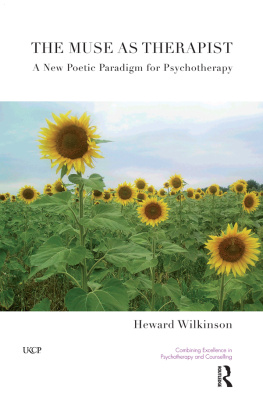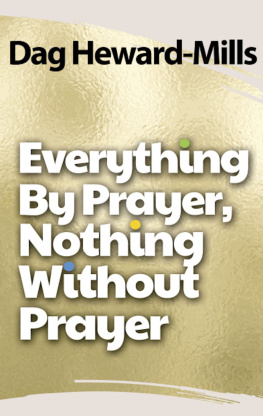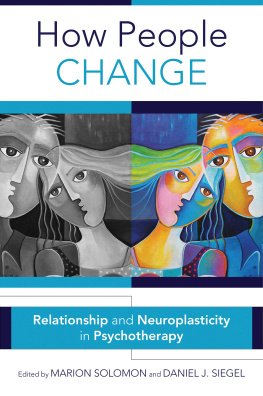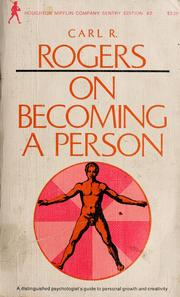Wilkinson Heward - The Muse as Therapist: A New Poetic Paradigm for Psychotherapy
Here you can read online Wilkinson Heward - The Muse as Therapist: A New Poetic Paradigm for Psychotherapy full text of the book (entire story) in english for free. Download pdf and epub, get meaning, cover and reviews about this ebook. publisher: Routledge, genre: Art. Description of the work, (preface) as well as reviews are available. Best literature library LitArk.com created for fans of good reading and offers a wide selection of genres:
Romance novel
Science fiction
Adventure
Detective
Science
History
Home and family
Prose
Art
Politics
Computer
Non-fiction
Religion
Business
Children
Humor
Choose a favorite category and find really read worthwhile books. Enjoy immersion in the world of imagination, feel the emotions of the characters or learn something new for yourself, make an fascinating discovery.
- Book:The Muse as Therapist: A New Poetic Paradigm for Psychotherapy
- Author:
- Publisher:Routledge
- Genre:
- Rating:4 / 5
- Favourites:Add to favourites
- Your mark:
- 80
- 1
- 2
- 3
- 4
- 5
The Muse as Therapist: A New Poetic Paradigm for Psychotherapy: summary, description and annotation
We offer to read an annotation, description, summary or preface (depends on what the author of the book "The Muse as Therapist: A New Poetic Paradigm for Psychotherapy" wrote himself). If you haven't found the necessary information about the book — write in the comments, we will try to find it.
The Muse as Therapist: A New Poetic Paradigm for Psychotherapy — read online for free the complete book (whole text) full work
Below is the text of the book, divided by pages. System saving the place of the last page read, allows you to conveniently read the book "The Muse as Therapist: A New Poetic Paradigm for Psychotherapy" online for free, without having to search again every time where you left off. Put a bookmark, and you can go to the page where you finished reading at any time.
Font size:
Interval:
Bookmark:
First published 2009 by Karnac Books Ltd.
Published 2018 by Routledge
2 Park Square, Milton Park, Abingdon, Oxon OX14 4RN
711 Third Avenue, New York, NY 10017, USA
Routledge is an imprint of the Taylor & Francis Group, an informa business
Copyright 2009 by Heward Wilkinson
http://hewardwilkinson.co.uk
The right of Heward Wilkinson to be identified as the author of this work has been asserted in accordance with 77 and 78 of the Copyright Design and Patents Act 1988.
All rights reserved. No part of this book may be reprinted or reproduced or utilised in any form or by any electronic, mechanical, or other means, now known or hereafter invented, including photocopying and recording, or in any information storage or retrieval system, without permission in writing from the publishers.
Notice:
Product or corporate names may be trademarks or registered trademarks, and are used only for identification and explanation without intent to infringe.
British Library Cataloguing in Publication Data
A C.I.P. for this book is available from the British Library
ISBN-13: 9781855755956 (pbk)
Typeset by Vikatan Publishing Solutions (p) Ltd., Chennai, India

We need another language that does not exist (outside poetry)a language that is steeped in temporal dynamics. (Daniel Stern, The Present Moment in Psychotherapy and Everyday Life )
Ah Sunflower, weary of time,
Who countest the steps of the sun;
Seeking after that sweet golden clime
Where the travellers journey is done;
Where the Youth pined away with desire,
And the pale virgin shrouded in snow,
Arise from their graves, and aspire
Where my Sunflower wishes to go!
The fool sees not the same tree that a wise man sees.
He who would do good to another must do it in Minute Particulars: general Good is the plea of the scoundrel, hypocrite, and flatterer, for Art and Science cannot exist but in minutely organized Particulars.
(William Blake)
INTRODUCTION
Discovering the Poetic Mystery at the Heart of Psychotherapy: An Unexpected Personal Journey
CHAPTER ONE
Therapy is Poetry
CHAPTER TWO
A Therapeutic Dialogue
CHAPTER THREE
Poetry or Existence?Poetry Dialogues with Philosophy Dialogues with Poetry
CHAPTER FOUR
Reality, Existence, and the Shakespeare Authorship Question: King Lear, Little Dorrit, and the Man Who Was Shakespeare
CHAPTER FIVE
Poetic Enactment and Propositional Truth: Poetry and Objectivity
CHAPTER SIX
Epilogue: The Poetry and Politics of Psychotherapy
Acknowledgement of those who have been part of ones journey, as both influences and as catalysts, is a joy. There are many who have played a part, and yet are too many to be named, or about whom I have to be silent for other reasons. And, with such a late first book, there are some, named or unnamed, who are, alas, now precious friends hid in deaths dateless night (Shakespeare, Sonnet 30).
These catalysts include many of my students in one setting or another over the years who have been inspirational, provocative, and kind to me, and at the same time goads and thorns in my side, and necessary in their challenges. I wish particularly to acknowledge the members of my Scarborough Integrative Psychotherapy training group, Karen Davies-Hough, June Norris, Stephen Brindley, Sue Dennis, Carol Webster, Irena Kurowska. Those I have taught at the Minster Centre and at University College Cork who have impacted me are alas too numerous to name specifically.
I bear in my heart and mind the creative imprint of so many clients over the years, some of whom do know the influence they have had upon me, and some who do not know. To all of them I repeat with love the words Beethoven wrote upon the title page of his Missa Solemnis :
Von Herzenmgen es weiderzu Herzen gehen
(From the heartmay it go againto the heart).
Many people in the early days of UKCP, when it was even still the Rugby Psychotherapy Conference, and then the United Kingdom Standing Conference for Psychotherapy, played a huge part in enabling me to find myself. I wish specially to acknowledge Alan Lidmila, Dorothy Hamilton, Elspeth Morley, Michael Pokorny, Haya Oakley, and Deryck Dyne. The support of colleagues in the Human-istic and Integrative Section of UKCP, too numerous to mention, have been essential in the background of this book. And, scrapping with the catalytic culture and community of the Metanoia Doctorate, has been a major goad in enabling me to find the determination, and compel the articulation, to finish my book. From my days as a Nurse Tutor I wish to acknowledge the support and creative space I received from Terry Whyke, Roy Saunders, David Brendan McGinnity, and my friend Martin Gajos. From the depths of past relationships to revered teachers and icons, I wish to mention Pat Maguire, Lance Marshall, FR Leavis, Otto Klemperer, John Wisdom.
My mother Kathleen, father Cuthbert, and Elsa and Pip Whiston, gave grounding love which enabled me over the years to overcome my obstacles to the extent which I have done. Cherished Friends, Colleagues, and Elders, part of my inspiration over the years, include Brian Lake, Laura Donington, Ken and Mairi Evans, Mike Phillips, Robert Duffy, Deborah Bartlett, Irene Farmer, Jenny Corrigall, Kate Wilkinson, Sue Aylwin, Maggie Forbes, Janet Croft, Snezana Milenkovic, Ann Sayers, Mary Winspear, Steve Silverton, Ioan Waight, Patricia and Eduardo Pitchon, James Grotstein, Dan Dorman, Derek Portwood, Paul Barber, and Alice Maher.
The teamwork of UKCP and Karnac, among whom Pippa Weitz has been outstanding, created the opening which has given me this opportunity.
My beloved wife Francis, to whom this book is dedicated, has given me the love, the tolerance of my madnesses, the containment, and the sharp creative provocation, which has enabled me to find myself enough to complete this first book.
Ackroyd, P. (2005). Shakespeare: The Biography . London: Chatto and Windus.
Anderson, M. (2005). Shakespeare by Another Name: The Life of Edward De Vere, Earl of Oxford, the Man Who Was Shakespeare . New York: Gotham Books/Penguin Groups, USA.
Andersen, H.C. (1837/2004). The Emperors New Clothes . Boston: Houghton Mifflin Company.
Anonymous (1605). The True Chronicle History of King Leir and His Three Daughters . Available online at Elizabethan Authors : http://www.elizabethanauthors.com/king-leir-1605-1-16.htm>;
Armourers Hall Website, online at: http://www.armourersandbrasiers.co.uk/history_hall.htm
Aron, L. (1996). A Meeting of Minds: Mutuality in Psychoanalysis . New York: Analytic Press.
Asimov, I. (1996). The Robots of Dawn , New York: Harper Collins.
Asimov, I. (1982). Foundations Edge . London: Grafton.
Asimov, I. (1986). Robots and Empire . London: Grafton.
Ashcroft, P. (unknown date). BBC Television Interview of unknown date.
Augustine (unknown date/1963). Confessions . Trans. R Warner. New York: Penguin.
Austin, J.L. (1961). A Plea for Excuses. In: J.O. Urmson & G.J. Warnock (Eds.), Philosophical Papers . London: Oxford University Press.
Austin, J.L. (1962a). How to do Things with Words . London: Oxford University Press.
Austin, J.L. (1962b). Sense and Sensibilia . London: Oxford University Press.
Ayer, A.J. (1948). Phenomenalism. Proceedings of the Aristotelian Society, 47 :163196.
Ayer, A.J. (1954). Philosophical Essays . London: Macmillan.
Bacon, F. Francis Bacon website, online at: http://home.hiwaay.net/~paul/shakspere/evidence1.html
Font size:
Interval:
Bookmark:
Similar books «The Muse as Therapist: A New Poetic Paradigm for Psychotherapy»
Look at similar books to The Muse as Therapist: A New Poetic Paradigm for Psychotherapy. We have selected literature similar in name and meaning in the hope of providing readers with more options to find new, interesting, not yet read works.
Discussion, reviews of the book The Muse as Therapist: A New Poetic Paradigm for Psychotherapy and just readers' own opinions. Leave your comments, write what you think about the work, its meaning or the main characters. Specify what exactly you liked and what you didn't like, and why you think so.







